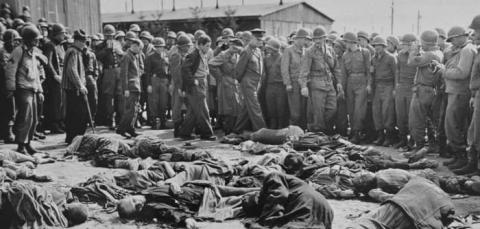General Eisenhower wanted to be in some of the pictures his soldiers were taking in liberated concentration camps. Here, he is at Ohrdruf with other high-ranking U.S. Army officers. They are witnessing a view of bodies of prisoners on the 12th of April, 1945. Online via the U.S. National Archives.
WARNING: SOME OF THE LINKS IN THIS CHAPTER, PARTICULARLY THE VIDEO CLIPS, DEPICT GRAPHIC IMAGES OF WAR AND CRIMES AGAINST HUMANITY. PROCEED WITH CAUTION.
THE CLIPS ARE PROVIDED AS PRIMARY-SOURCE EVIDENCE OF NAZI ATROCITIES DURING WORLD WAR II. PLEASE PREVIEW ALL VIDEOS BEFORE ALLOWING CHILDREN TO SEE THEM. SOME ARE NOT SUITABLE FOR CHILDREN AT ALL.
At the end of World War II, General Eisenhower made a decision to personally visit as many Nazi concentration camps as he could. His reason? He wanted to document the camps and their appalling conditions.
Anticipating a time when Nazi atrocities might be denied, General Eisenhower also ordered the filming and photographing of camps as they were liberated. Members of the U.S. Army Signal Corpsrecorded approximately 80,000 feet of moving film, together with still photographs.
Within months after the war in Europe was over, about 6,000 feet of that film footage was excerpted to create a one-hour documentary called "Nazi Concentration Camp". Prosecutors used the film, which is graphically gruesome, to prove that Nazi leaders, on trial at Nuremberg, had perpetrated unbelievably heinous crimes against humanity.
Thomas Dodd, one of the U.S. prosecutors, introduced the film into evidence on the 29th of November, 1945. When the lights came up, after the trial film was screened, people had a new understanding of what the words "concentration camp" really meant.
Eisenhower wanted to be in as many pictures as possible to prove the death camps really existed. He was sometimes accompanied by Generals Bradley and Patton.
It didn't take long for Eisenhower's concerns to materialize. Despite his presence in many photographs, Holocaust deniers persist to this day.
The U.S. National Archives contain a great deal of evidence regarding World War II. What do those archives reveal about the Holocaust?

No comments:
Post a Comment